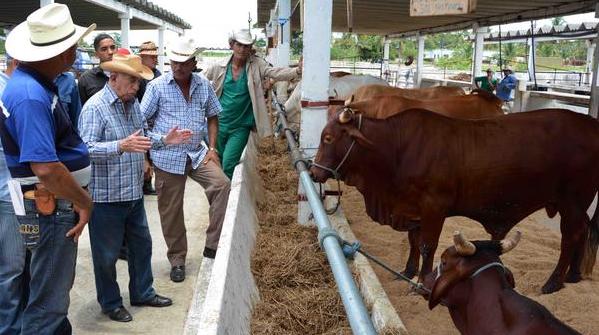When a tormented Miguel Díaz-Canel said that there is no time for the long term, he unwittingly emulated that phrase with which the famous intellectual swindler John M. Keynes countered those who demonstrated that, in the long term, his theory was disastrous: calmly and cynically, he stated: "in the long run, everyone's dead." In Cuba the situation is somewhat different: in the short term, everyone is dying ... of hunger.
To avoid the imminent outcome, a commission of experts led by Vice President Jorge Luis Tapia consulted agricultural producers and Cuban scientists, with two measures resulting from this "democratic" forum: to relax the package passed for agriculture, and allow the controlled slaughter of older cattle.
According to Díaz-Canel, the current concept is "to open up everything that can favor the producer, stimulate production and eliminate obstacles", but, to be consistent, he should start by asking himself who is discouraging production, hampering the producer and throwing up obstacles in the first place.
The answer is obvious. If all the measures proposed to facilitate agricultural production are based on suppressing measures previously taken by the Cuban Government, then when will the Government recognize that it is the obstacle? Why are those who placed the obstacles the same ones in charge of removing them? What guarantees are those that those who "with the best intentions" errantly put up the obstacles, now, also "with the best intentions", are going to be able to remove them?
It is a macabre joke that Jorge Luis Tapia, the First Secretary of the Party in Camagüey between 2012 and 2019, is heading up this Commission and announcing the requirements —among them, that the livestock numbers should not decrease— that producers must meet in order to slaughter one animal per year.
How many Camagüey steaks did Tapia consume while the cows dropped like flies from thirst in the territory he oversaw? Actually, probably none, as the Central Committee prefers gourmet yearling meat imported from Uruguay.
This is a classic case of "I break your legs, give you the crutches and expect you to consider me your savior." The only thing Cuban government officials are doing is dismantling what they themselves created to begin with. Not a previous government, not Yankee imperialism; no, they themselves raised the prices of electricity, water, supplies and everything else just three months ago, and they themselves are "loosening" them now, and then asking the people to appreciate their efforts and to please do them the favor of not starving, or protesting.
And the measures are not even going to benefit everyone. Some will benefit only those producers who comply with a plan that will be "very rigorous." As determined by the implacable Machado Ventura, whoever complies with the plan will be paid better for their milk, and will be able to slaughter a cow. And who lays down the rules? Exactly, Machado Ventura and his people.
What sense does it make when they are going to reduce the expenses that they just increased on growers? This means that they will receive 3.4 billion pesos more from the State budget - which someone will have to pay for. Although the Castro-Callejas family could do it, it has not spoken on the matter, so it seems that it will be all Cubans, those who already allocate between 42 and 50% of their income just for food, who will have to pony up 300 pesos more a year in order to defray the damage that the "Ordering Task" has done to Cuba's already disastrous agriculture.
At this point, some readers might assume that Cuban farmers are incensed with the Government, but this is not, actually, the case. According to Tapia, "at the meeting the producers expressed their support for and trust in the Revolution, its historical generation, and its continuity." In other words, the farmers trust those who put the obstacles in their way and then removed them, all while being coerced.
And Tapia was actually telling the truth, apparently. One of the producers participating in the meeting explained that the ranchers would be delighted if, "having been good and compliant, the State would let them slaughter one animal a year ...". If this is not anthropological damage mixed with Stockholm Syndrome, nothing is.
The sad thing, the macabre twist that the Government so often places on things, is that while Díaz-Canel removes the obstacles that he or his bosses previously placed on them, a pound of rice now costs 60 pesos. Thus, the raise given to those Cuban scientists who are creating vaccines against the coronavirus is not even enough to buy a sack of rice. A 12th-century Chinese farmer was better paid.
